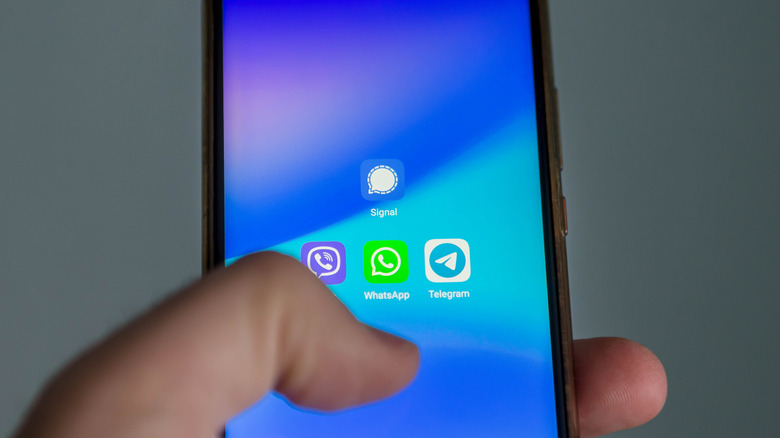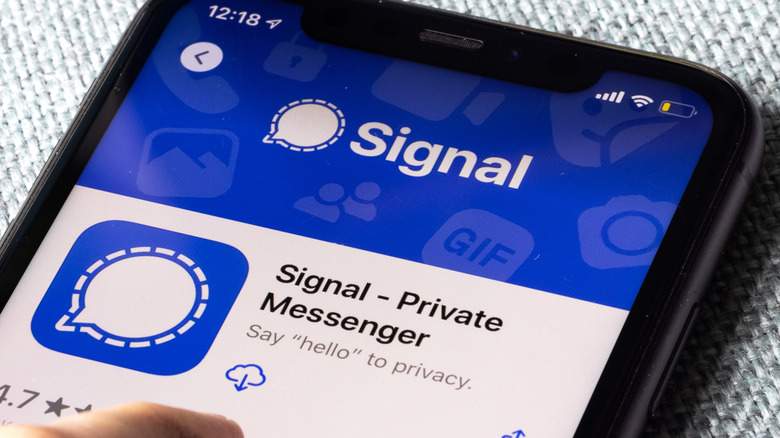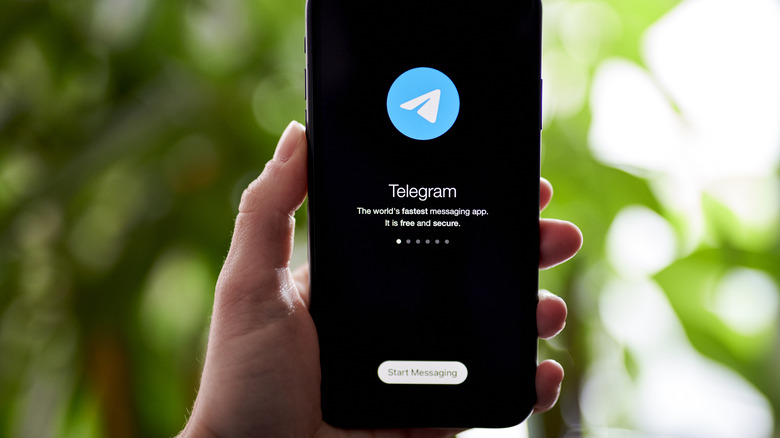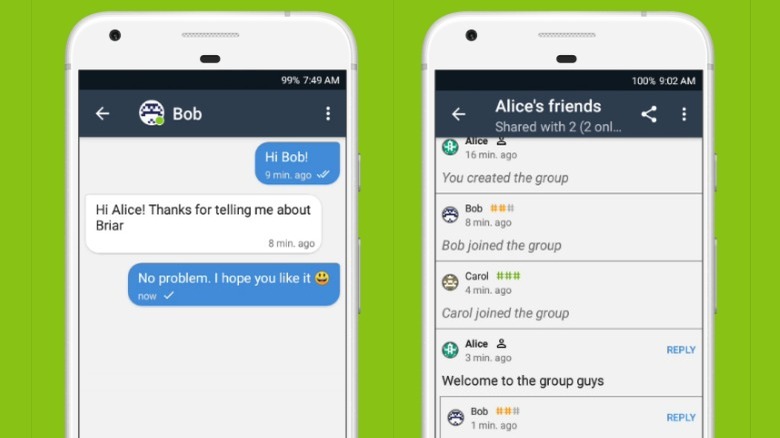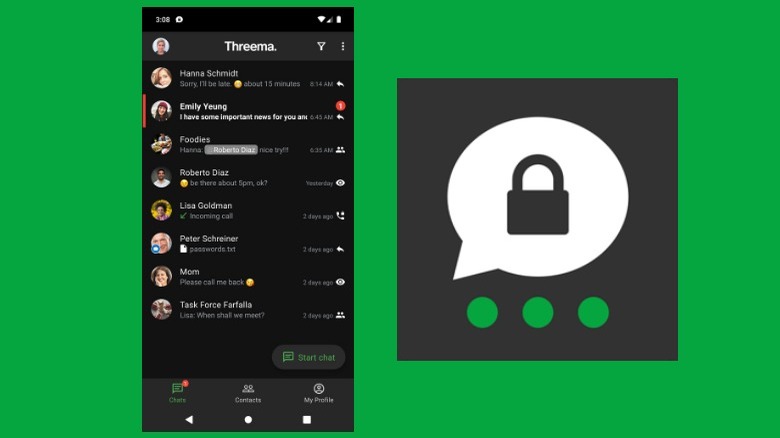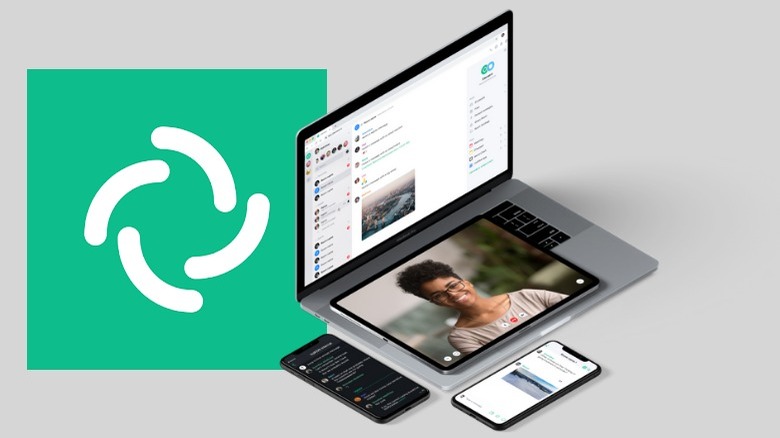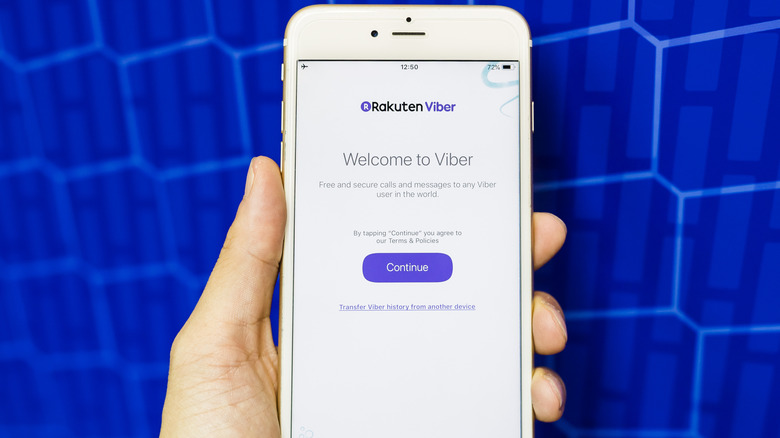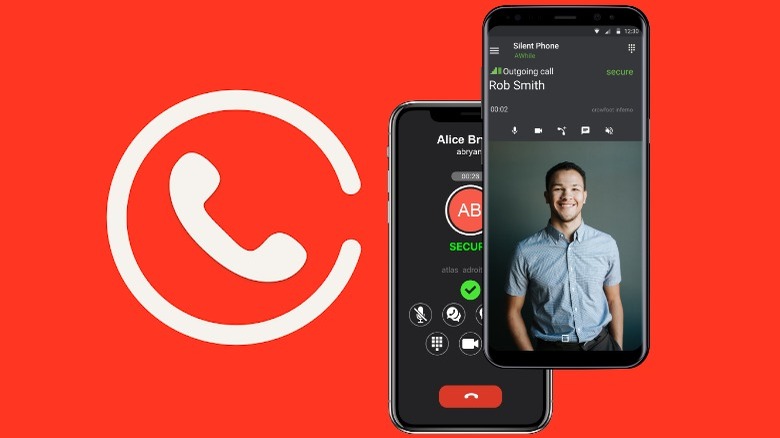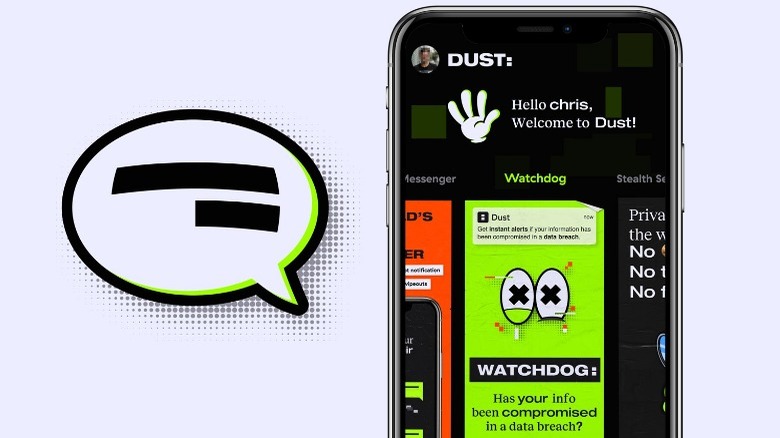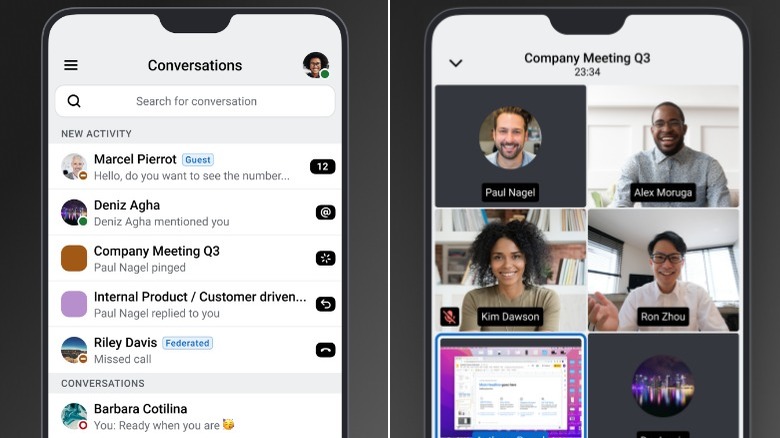10 Encrypted Messaging Apps You Can Download For Android Right Now
Messaging has become an everyday part of life, allowing us to connect with people around the world instantly. Chances are that you'll receive a message notification while reading this article. However, the more society relies on online communication, the more it must be aware of protecting our personal information. Over time, trusted messaging apps compromised or sold our data, giving rise to much-needed secure solutions like End-to-End Encryption (E2EE) technology.
Ensuring the confidentiality of conversations, protecting sensitive information, and guarding against data breaches have become top priorities for many. Fortunately, there are several encrypted messaging apps available for Android devices that prioritize end-to-end encryption and provide powerful security features. These apps offer users the ability to exchange messages, make video calls, and share files, while keeping their data safe.
They also ensure that your data is encrypted and only accessible to you and the intended recipient. From open-source platforms to decentralized networks, each app brings its unique approach to data security and user privacy. Here are 10 encrypted messaging apps you can download for Android right now.
Signal
Signal, available on the Play Store, is one of the most secure end-to-end encrypted platforms. This messaging app is part of a growing movement among app and software developers embracing open-source software. By making its code transparent to anyone with the necessary expertise, Signal enables users to verify its claims of security.
Signal's open-source software guarantees an entirely ad-free and tracker-free experience, at no cost to users. Its objective is to create a messaging app that prioritizes data protection. Your sensitive information stays on your devices, and all messages sent through the app are encrypted. In fact, Signal's commitment to security has garnered the trust of notable entities, including members of the U.S. Senate and certain divisions of the U.S. military, who rely on it for their confidential communications.
Signal is not only safe but feature-heavy. With Signal, you can exchange messages, images, and emojis, and even make secure video calls. What sets Signal apart is its cross-platform compatibility for document downloads. Whether you're an Android user securely sending a PDF or other file, or an iPhone user downloading and utilizing the same file, Signal makes it easy. While it may seem like a minor detail, this often-overlooked feature is actually quite rare. Combining exceptional security, a comprehensive feature set, and a price tag of zero, Signal is one of the top E2EE apps currently available for Android. All you need to get started is a phone number for registration.
WhatsApp is one of the world's most popular end-to-end encrypted apps which alone makes it worth looking at. After all, there's no point in a messaging app if you're the only one using it. Many frequent travelers already have Whatsapp and you can easily import contacts from your contact list.
WhatsApp offers a wide range of features, including messaging, video calls, and easy sharing of images and videos. Additionally, it includes a feature for disappearing messages, ensuring privacy and confidentiality. However, there are a few aspects that may catch you off guard, and they're not features. Privacy concerns have now become serious enough that some have elected not to use WhatsApp anymore. WhatsApp is owned by Meta, the social media giant that began with Facebook and progressively acquired various platforms. If you've been following Meta's news, you might be aware of their history of exploiting user data for profit.
Meta has faced fines for incidents involving data leaks, mining, and selling. This unfortunate reality highlights the adage, "You're not the customer; you're the product." With access to vast amounts of data, Meta capitalizes on monetizing user information. While this aligns with the nature of social media businesses, WhatsApp has consistently demonstrated an inability to be fully trusted with your data.
Telegram
When it comes to data security, Telegram stands out as a leading player in end-to-end encryption. Made for privacy-conscious users, Telegram offers a range of features and functionalities that make it a top choice for secure messaging. One notable aspect of Telegram is its large group chats of up to 200,000 members. The Secret Chats feature ensures that your conversations remain private and secure. Additionally, Telegram provides self-destructing messages with adjustable timers. The platform places a strong emphasis on user privacy and data security. It incorporates features like two-factor authentication and the option to hide phone numbers from other users.
What sets Telegram apart from other messaging apps is its unique approach to data storage. While most platforms retain user data indefinitely, Telegram takes a different stance. Any data stored on Telegram servers come with an expiration date. By default, this data is deleted after six months of inactivity. Users also have the option to customize the self-destruct date. This approach not only saves costs for Telegram but also enhances security. After all, there's only so much value to storing conversations like "LOL" or "WYD."
The platform even issues an open challenge to hackers, inviting them to attempt breaching its security protocols. Any hacker who successfully exposes a security weakness can win a cash prize of up to $300,000. As an open-source program, Telegram has attracted scrutiny from security experts worldwide, making it unlikely that any vulnerabilities remain undiscovered, especially with that bounty.
Briar
Briar is a secure network, founded on the principles of The Onion Routing project (TOR), with a clear mission to uphold essential values such as freedom of expression, freedom of association, and the right to privacy, according to its founder, Michael Rogers. While it prioritizes security, the messaging app lacks the refinement of its more popular counterparts. What sets Briar apart from conventional messaging apps is its decentralization. Unlike platforms reliant on central servers, Briar adopts a distributed system, where users subscribing to specific forums or messaging boards possess a complete copy of the data. This architecture ensures that data can't be manipulated, operating similarly to blockchain used in cryptocurrencies, but tailored for forum-based interactions.
Another feature that makes Briar unique is that it employs a direct device-to-device message synchronization method that can function without an internet connection. Since the app only stores data on users' devices, it can establish connections via Bluetooth or Wi-Fi, independent of internet access. Users can create a network by connecting and relying on each other, eventually forming a broader network.
The concept behind this approach is akin to leapfrogging messages from one user to another, allowing Briar to potentially establish connections anywhere, even without internet connectivity, as long as enough users are present. However, it's important to note that Briar requires a constant connection to Tor, which may drain your phone's battery life.
Threema
Threema can be used with almost zero data collection. Unlike most apps, Threema allows users to sign up without an email address or phone number, making it one of the few platforms that prioritizes user anonymity. Moreover, Threema's servers store minimal user data, and encryption codes reside solely on the individual devices where the app is installed.
Threema stands out as one of the most secure messaging apps available today. If your primary concern is security, whether as an individual or a company, Threema could be the ideal choice. While Threema does offer pricing plans for both individual users and companies, it's important to note that the app is not free.
Users will have to pay a one-time fee of $5 to gain access to the app. This upfront cost may be seen as a drawback, particularly when there are numerous free, highly secure E2EE apps readily available. However, considering the importance of data privacy, Threema's pricing model aligns with its commitment to user security. While terms and conditions of other apps can change, violating a contractual agreement after a financial exchange carries greater consequences and is less likely to occur. In a sense, Threema has clients, while free apps merely have users. Threema's value proposition is summarized on its homepage: "Pay once, chat forever. No collection of user data. Open Source."
Element
Element is primarily focused on businesses and enterprise solutions, but it is also available to individual users. Built on the decentralized network of Matrix.org, Element ensures reliable server availability and uninterrupted encrypted messaging services.
Individual users have access to secure messaging, public chatrooms, and standard features commonly found in encrypted messaging apps. However, the main draw of Element lies in its B2B model, enabling companies and organizations of various sizes to customize their network and internal communications according to their specific needs.
Element's smooth user interface and minimalist design provide a user-friendly experience across both Android phones and desktop platforms. With a strict no-data collection policy, Element offers excellent security for its users. However, the standout feature of Element is its customizable servers and security protocols, which prove invaluable for businesses handling sensitive data. While Element offers reliability and ease of setup, it may lack the refinement of more popular apps like WhatsApp, making it tricky to persuade your contacts to make the switch.
Viber
Viber is one of WhatsApp's strongest competitors. This versatile platform offers a comprehensive range of features, enabling users to send voice and text messages, share photos, videos, and even opt for self-destructing messages. The Viber app has an intuitive and user-friendly interface and a clean design for easy navigation. Viber has every feature that WhatsApp has but without the controversy and data leaks.
This isn't to say that Viber is perfect. While Viber doesn't have a history of data leaks, it does collect a significant amount of user data, warranting some caution. However, it's important to note that Viber employs E2EE for every message, image, or communication sent. This means that Viber cannot access or view any of the actual content exchanged through the app.
Nonetheless, Viber does have access to certain aspects of your online presence if you choose to log in using your social media accounts. This grants Viber access to generic data present in your profile, and it also enables the platform to monitor your browsing activity and track the links you click on. Mostly, this is just standard data collection used in targeted advertisements. While the content of your messages remains secure, it is important to recognize that Viber engages in data mining, focusing on usage patterns and social media information.
Silent Phone
Silent Phone is a very secure messaging app utilizing E2EE that not only operates without an internet connection, but also prohibits screenshotting, and is available to users completely free of charge. What sets Silent Phone apart is its lack of long-term data storage. All messages and communications exchanged within the app are on a 90-day timer that automatically deletes them. While this may seem like overkill for everyday users, this additional layer of security is vital for those handling sensitive data.
While Silent Phone is available for personal use, it is designed primarily for the business-to-business (B2B) sector. As part of a larger security suite called Silent Circle, Silent Phone comes bundled with two other packages: Silent World and Silent Manager. Silent World allows users to make protected phone calls to landlines and cell networks using Silent Phone's encrypted network and firewalls. Silent Manager, on the other hand, is an enterprise management software solution equipped with the same security and encryption features.
Silent Phone is very secure, but you'll only be able to access it from your phone. In order to use Silent Circle with a browser, you'll need to also have an account with one of the other platforms. It's a great integration for a corporate network, but as an individual, it can be annoying to switch between platforms to access the same features on different devices.
Dust
Besides its clever marketing – "The app that protects your ass(ets)" – Dust is an impressive encryption messaging service that does exactly what it promises. The Dust suite has three main components: encrypted messaging, a data watchdog, and encrypted search. Dust uses its own brand of E2EE that does not store any data on servers. In addition to the standard array of messaging features, it also has a unique feature called "no trace." This feature erases message metadata, making it harder to track conversations or gather information about user activity.
With Dust, you have the flexibility to delete messages not only from your own device but also from the recipient's phone whenever you want. In group chats, all users can delete messages, ensuring they disappear from all devices. Dust can do this anytime, unlike other apps where this feature may become unavailable after a message is viewed.
The data watchdog is a handy feature for those concerned with their data security. It actively monitors known data leaks, searching the dark web and potential data sales. If your data has been compromised and appears in any search, you'll get a notification and help to tighten your security. Finally, Dust offers a secure search feature that respects your privacy. It doesn't collect cookies or metadata, giving users the freedom to search without worrying about their online habits being used for targeted advertising.
Wire
Founded by Wire Swiss, Wire's parent company was originally located in Switzerland, a country famous for its privacy laws. Its headquarters has since been moved to the U.S. and then later to Berlin. Wire utilizes its own Proteus encryption protocol, built upon the Signal protocol, with open-source code that allows for external security audits from outside parties.
While the mobile and web versions of Wire are free, a premium tier is available for businesses. Like Silent Circle, Wire seems to have moved more toward a B2B-focused model but can still be downloaded on Android for individual use. Wire proudly claims to be trusted by several different government agencies and nations to keep their messaging data secure. Wire provides a reliable messaging app that prioritizes advanced encryption technology and a strong privacy foundation. For both individual and business use, Wire's features and reputation make it a strong contender among encrypted messaging platforms.
